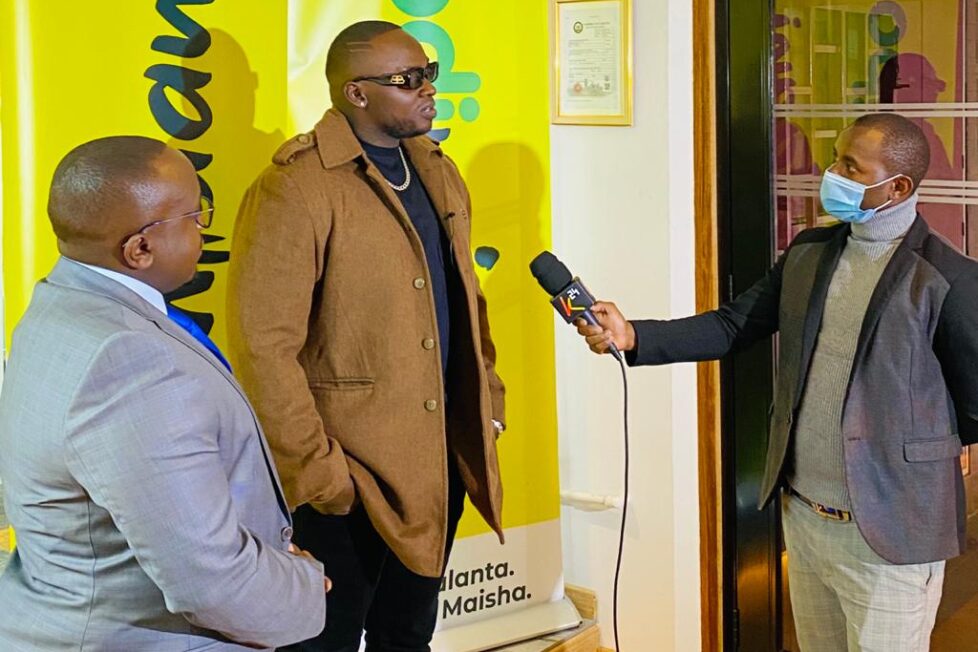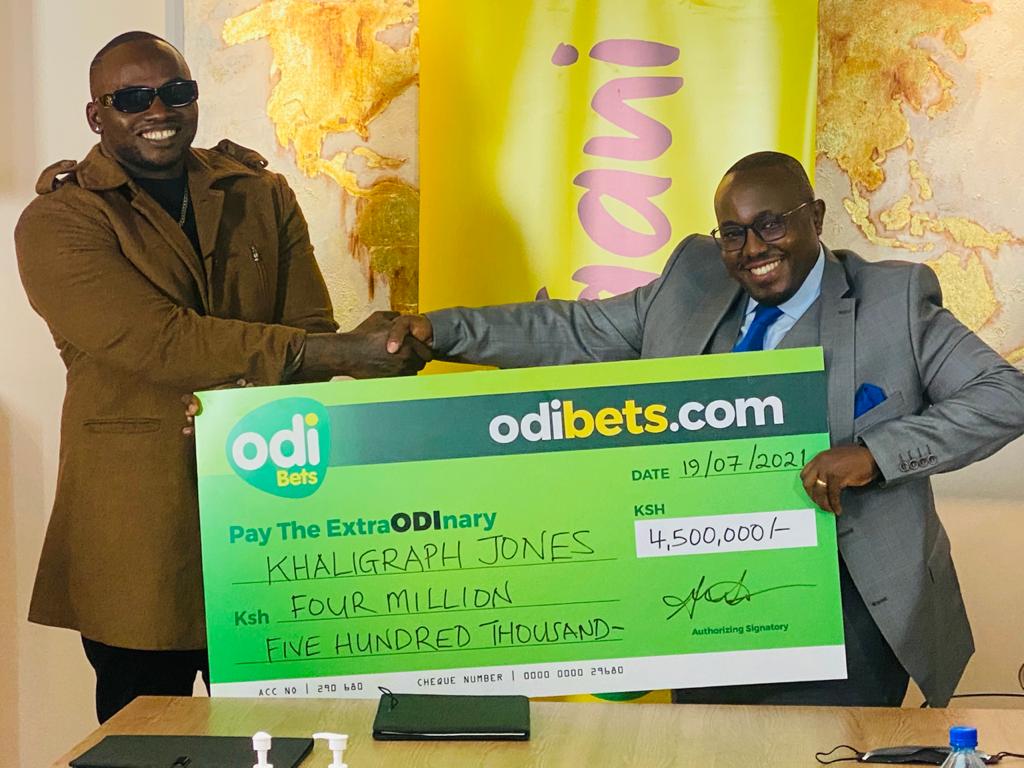Khaligraph Jones Unveils OdiNare Rap Challenge
The online rap challenge hopes to uplift talented rappers, to make Kenyan Hip Hop Great Again.

The online rap challenge hopes to uplift talented rappers, to make Kenyan Hip Hop Great Again.

Khaligraph Jones went live on Instagram last week. He had something to say. He highlighted, in a lengthy video, challenges Kenyan rappers were battling. The solution? An online rap challenge. He put his money where his mouth is.
“#HeshimuKipaji. As From Monday I’m gonna Be Giving 3 artists a chance To get a Record Deal under my Label Blu Ink Corp, will Also give yall A chance to win some Money, Am putting 500k on the Table (no corporate sponsorship, Self Made Nigga) for an online competition that is going to run For 2 weeks. More details on Monday. hopefully by the end of this madharau Itapungua. #heshimuKipaji. #respecttheogs”
A cash prize of Kshs 500,000 ($5000) for the winner of the challenge, prizes for the runners and second-runners up, a one-time record deal with his record label Blue Ink Corp, and to sweeten the deal, an opportunity for the winner to do a collabo with him. Too good to be true. But by Monday, July 19, 2021, Odibets, a betting firm, threw their hat in the ring, sensing an opportunity to endear themselves to the creatives and empower talented youth.
Odibets topped up Khaligraph’s Kshs 500,000 offer with a Kshs 4.5 million cash boost. The winner will now walk away with Kshs 1 million cash prize, with the runners up and second runners up bagging equally attractive prizes.
In a press conference to hand over the boost, Odibets General Manager, Dedan Mungai, stated:
“We decided to support Khaligraph and the whole Kenyan music industry as a way of giving back to society and nurturing untapped talent that is out there.”

The #HeshimuKipaji hashtag is a protest against the irresponsible posturing by Dr Ezekiel Mutua, the Kenya Film Classification Board (KFCB) boss, who in a recent radio interview, suggested that Kenyan artists were broke.
KFCB is a state corporation whose mandate is to “regulate the creation, broadcasting, possession, distribution, and exhibition of films by rating them” but under Dr Mutua’s leadership, an overzealous Christian moralist, KFCB has transformed “regulation” into outright censorship, and his unending fights with individual artists.
Khaligraph’s rap challenge is a protest against the incompetence, insensitiveness, and non-responsiveness of government officers such as Dr. Mutua. The online rap challenge hopes to uplift talented rappers. He wants to make Kenyan Hip Hop Great Again.
Khaligraph knows too well the value of such opportunities. In 2009, The Channel O Emcee Africa tour, sponsored by Sprite, came calling, in search for the premier freestyle MC. They dubbed it the Channel O MC Challenge. At the heart of the competition was the desire to initiate awareness of the ‘street life’ as a sociocultural context captured by local hip hop music. Khaligraph, then a 19-year-old lad, laced his gloved and threw himself into the ring. TheChannel O MC Challenge marked the beginning of Khaligraph’s ascendancy.
The online rap challenge — OdiNare — a functional spur-of-the-moment branding, characterizes the challenge as an Odibets Odimtaani CSR Initiative, but more, precisely, it speaks to “ordinary people” or in Shengspeak, ma-odinare, and attracts the attention and support of the “Odi generation”.
While Khaligraph is of the old hip hop cloth, the Odi Generation are the progenitors of a new sound that emerged with the ‘Odi Dance’ by Timeless Noel, Hype Ochi and Jabidii, and popularized in a collaboration with Bruz Newton’s Bazokizo. The song went viral, captured mainstream media attention, and was nominated for Groove Song of the Year and Groove Afro pop at the 2017 Groove Awards. The choreographed video was also nominated for Breakthrough song of the Year at Pulse Music Video Awards.
Musician and music scholar Dan Aceda coined a word for this kind of music: Odi Pop — a uniquely Kenyan music style blending localized Hip Hop with Reggea and Dancehall tunes to create an African Rhythm base performed in a sing-along rap in heavy Kiswahili or Sheng language.
“I am proposing the collective term “Odi-pop” to refer to all the sub styles of this new sound”, he wrote, “I am aware of each group having named their style separately e.g Gengetone, Dabonge style and so on and my definition is not trying to replace that. For me this musical style is basically pop but with a common sound (hip-hop rap influence blended with Caribbean phrase and rhyme schemes, all constructed on an African rhythm base and performed in sing-along rap with heavy Kiswahili/Sheng inflections).”
Odi Pop injected Kenyan music with a wildly infectious, enchanting, and controversial dance craze and meme culture, and has borne the brunt of Dr. Alfred Mutua’s censorship sword. Khaligraph has urged Dr. Ezekiel Mutua to sit-down with artistes and strategize on how to support them other than shaming them in public.
“I believe a guy in his position should be offering solutions and helping artistes like Odibets is doing instead of rebuking them,” he said.
It is no surprise that Khaligraph’s OdiNare is an online rap challenge. Odi Pop and other markers of modern urban music are online natives. Researcher ODIPODEV in an analysis of trends commented that Odi Pop and Gengetone owes their popularity to Kenya’s fast internet and smartphones, noting that “In the case of ‘Odi pop’, the songs seem to come with a long tail of user-generated content for the artist’s audiences to snack on – that is, commentary, reactions, reviews or simply clipping highlights from the content piece, created by the audience themselves.”
By designing OdiNare as an online rap challenge, Khaligraph will exploit the potential for immediate feedback of reactions, commentary, and reviews as fan opinions battle alongside rappers battling for the Kshs 1 million cash prize and a record deal.
